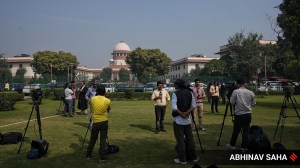- India
- International
It’s time to talk. Period
As per the latest National Family Health Survey (NFHS-4), 2015-16, rural Madhya Pradesh fares the worst in the country in menstrual health management, with only 26.4 per cent of women between the ages of 15 and 24 using hygienic methods.
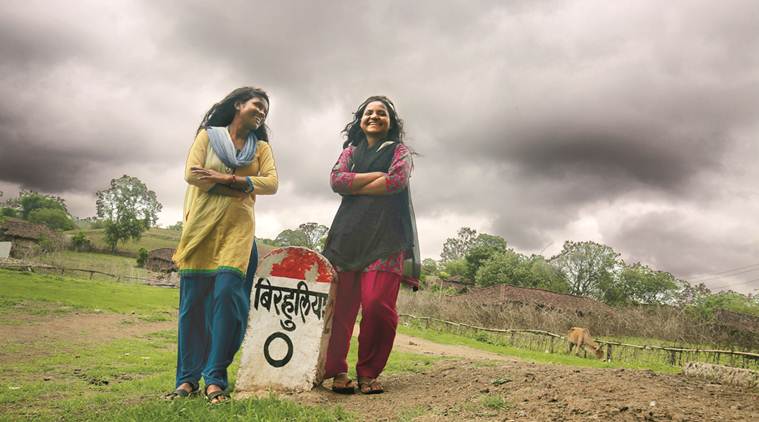 Manisha (left) learnt that there was a thing such as a sanitary napkin for the first time from friend Triveni (Express Photo by Renuka Puri)
Manisha (left) learnt that there was a thing such as a sanitary napkin for the first time from friend Triveni (Express Photo by Renuka Puri)
Rural Madhya Pradesh fared the worst in the country in menstrual health hygiene in the latest National Family Health Survey. The Indian Express on what stands between three girls of Umaria district and a sanitary napkin
MANISHA SINGH MESRAM, 15
Till three years ago, Manisha Singh Mesram’s life was no different from her brother’s and cousins’. They would go to school together, and in their free time, play football and kabbadi. Many hours would be spent swinging from the suspended roots of the village banyan tree. In the evening, the three would take the family cows and buffaloes out for grazing and carry water home in large pots from the village well. On some days after school, Manisha’s mother Lalti Bai would insist that she skip play and learn a few basic skills in the kitchen — how to prepare daal-chawal and kaali chai. Manisha never minded.
But a few months after she turned 12, Manisha’s life took a turn. Like most girls her age, she got her ‘mahvari (period)’.
Lalti Bai took her to one of the three rooms in their mud-and-thatch house in Madhya Pradesh’s Birhuliya village and directed her to open a trunk. Inside were a large stack of old cotton saris and petticoats, bedsheets, and some of her father’s old shirts. “For the next few hours, my mother meticulously taught me how to tear the clothes into rectangles the size of a big notebook, fold them into the shape of bricks, and tie them around my waist like a langot,” giggles Manisha, burying her face in her lap.
Her mother also taught her the rules for those five days of the month — don’t enter the kitchen, don’t touch any utensils, don’t serve food, don’t enter the gaushala, don’t go to the temple, don’t go near the village well, don’t touch the pickle, and don’t go to school.

Manisha, a student of Class 11, at a government school 3 km from Birhuliya in Umaria district, says it took her a year to get used to the series of dont’s. But every month, it is not this that sinks her heart when the time comes. It is the thought of how to manage her periods, without an underwear (the women here don’t wear any), without staining her clothes, without a place to hang the rectangular strips out to dry, and without anyone, ever getting to know.
As per the latest National Family Health Survey (NFHS-4), 2015-16, rural Madhya Pradesh fares the worst in the country in menstrual health management, with only 26.4 per cent of women between the ages of 15 and 24 using hygienic methods. Urban MP, on the other hand, fares much better, at more than 65 per cent. However, this is far below states such as Tamil Nadu and Kerala, where around 91 per cent and 90 per cent women respectively follow hygienic methods.
A 2014 study by Dasra, an organisation that works for social change, showed that 70 per cent of mothers in India consider menstruation “dirty”. As per a study in BMJ medical journal, ‘Menstrual hygiene management among adolescent girls in India’, only 55 per cent of girls saw it as “normal”.
More recently, menstrual hygiene has been in the news following a campaign urging the Centre to exempt sanitary pads from the Goods and Services Tax, where it is put in the 12 per cent slab. On July 11, the Finance Ministry clarified that “the tax incidence on this item before and after GST is the same or less”. “In pre-GST, (sanitary napkins) attracted concessional excise duty of 6 per cent and 5 per cent VAT, and pre-GST estimated total tax incidence… was 13.68 per cent.”
READ | Last year, govt spent Rs 40-cr in giving sanitary napkins in 18 states
Far away from the campaigns in the metros, Manisha talks about her cleanliness routine during menstruation, common to all the 277 women and girls in Birhuliya. “Twice every day, we change our langots, wash the stained cloth and dry it under our clothes so that the men don’t see it. I don’t go to school or to play, but even then my clothes stain. The cloth keeps shifting.”
Her voice growing angry, she adds, “Despite stomach cramps, I am expected to discreetly wash the stained clothes. There is a block of stone kept outside especially for this.” It’s a red slab in the house’s backyard.
“The MP government says 12 per cent of the state’s women use sanitary pads during menstruation, but if you look at rural areas, especially tribal villages such as Kathai and Birhuliya, not even 1 per cent use them. There are few Primary Health Centres near these villages and even these do not have gynaecologists,” says Dr Ramesh Mewara, 50, the director of Vasudha Vikas Sansthan, an organisation that works on women health issues in rural Madhya Pradesh.
Manisha’s father Antram Singh, 48, works as a paddy farmer. Lalti Bai says they make just about enough to “feed the family”.
All the 126 homes in Birhuliya, spread over 234.18 hectares, have new toilets, constructed under the Swachh Bharat Abhiyan, but none is in use. “There is no water, how do we use them? We have all been going to the forest for decades,” says Antram Singh, pointing to the lock on the toilet in his backyard.
While Umaria has electricity, power supply is rare.
Fiddling with a strand of her thick hair, which she has left loose today, Manisha talks about “waking up at 5 am and going to the woods to do my business” on the days she has her periods. “We have to remove the stained cloth and keep it in the bushes and then tie it again. Sabko chakatte ho jaate hain (Everyone gets rashes),” she says, her eyes fixed on the mud floor of her hut.
There is no option, Lalti Bai shrugs. “Hum bhi jungle mein gaye, bachche bhi jayenge, humne bhi kapda lagaya, bachche bhi yahi lagayenge (We went to the jungle, so will our children, we used cloth, so will they),” says the 40-year-old.
But unlike what Lalti Bai believes, Manisha now knows of “options”. Her friend Triveni showed her one, when she returned to the village from a tribal girls’ hostel in Pali for her summer holidays last year.
TRIVENI PARASATE, 16
Four years ago, Triveni’s parents — father Sant Ram, 41, and mother Santra Bai, 39 — agreed to send her to a tribal girls’ hostel in Pali, 50 km from Birhuliya, during an admission drive conducted by the hostel’s warden in their village. Three months into her stay at the hostel, while she was also attending the nearby school, she had her first period. “I told the warden. She explained that all girls menstruate and that there was nothing to worry about,” says Triveni, now a Class 11 student.
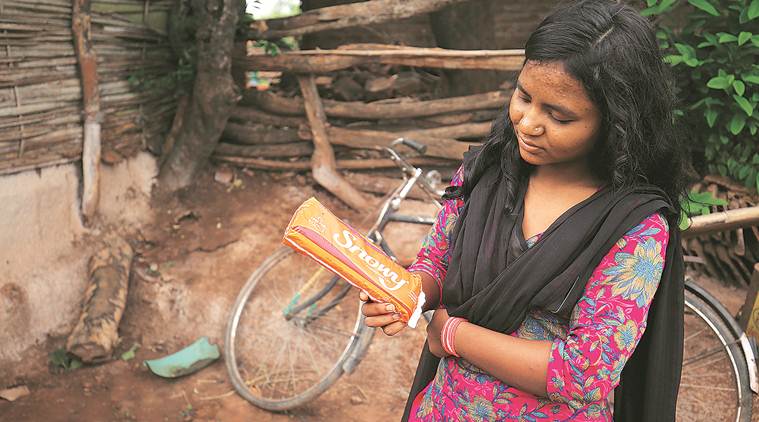 When Triveni brought a pack of locally-made ‘Snowy’ sanitary pads from her tribal girls’ hostel, it was the first time many in the village saw one(Express Photo by Renuka Puri)
When Triveni brought a pack of locally-made ‘Snowy’ sanitary pads from her tribal girls’ hostel, it was the first time many in the village saw one(Express Photo by Renuka Puri)
The warden also handed over something Triveni had never seen before. It was a pack of six sanitary pads, wrapped in a glossy orange cover that said ‘Snowy’. “The pads were for free and the warden showed me how to use them,” she says, sitting on the floor of the anganwadi centre at Birhuliya.
But the pads were given out only once a month. When she came home once during the summer vacations, Triveni wasn’t carrying any and was forced to turn to the langot again. Last year, Triveni saved a pack and brought it home for the holidays. Manisha was the first person she showed it to.
“I told her how the pad was used and also gave her one,” says Triveni. Manisha just smiles and keeps looking at the ground.
It was around the same time that Chanda Bai, an anganwadi worker, was sent to Birhuliya to sell a bag of sanitary napkins to the women. “We gave them a demonstration and distributed a few free packs. Most women were reluctant to even take the free samples. As for buying, even after a year, only three women in the village do it, and not regularly,” says Chanda Bai. “We sell it for Rs 20 a pack, Rs 10 lesser than the ones in the city, but yet no one buys them,” she says.
Smita Shendye, a consultant with the state’s Rashtriya Kishor Swasthya Karyakam, run with the National Rural Health Mission (NHM), says initiatives such as this have to fight “a number of factors” when it comes to menstrual health in rural India, including social stigmas and taboos. “We need education, water, sanitation… A large number of girls drop out of schools when they begin menstruating. Also, it is not just about reducing the prices of sanitary napkins or giving them for free, a piece of cloth is equally hygienic if it is washed and then dried in the sun. But most of the girls in villages feel shy to even spread out the cloth outdoors,” she says.
Census 2011 puts female literary rate in Birhuliya at 44.2 per cent (nearly half of male literacy).
Shendye, however, is hopeful about the state’s menstrual health programmes. “We have trained 9,000 women to talk about menstrual health in over 5,000 villages across 11 districts in MP. This covers only about 10 per cent of the state’s population, but things are improving,” she says.
“There are multiple issues at play here and we have been trying to the tackle them through the Udita project. Sanitary pads are being made available in remote villages through anganwadis. Though they are made by self-help groups and sold at a price — state government doesn’t use its own funds for it — it has made pads accessible,” says MP’s Women and Child Development (WCD) Minister Archana Chitnis, adding, “Soon we will launch a programme in all 51 districts of MP to educate women about the other options for menstruation, apart from pads.”
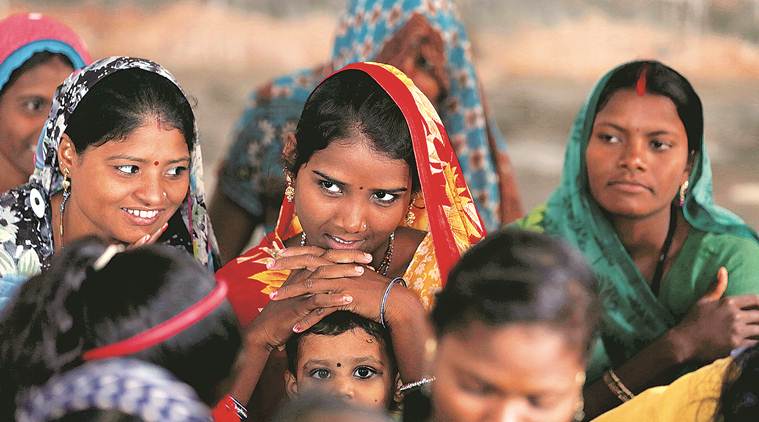 Lakshmi (centre) says as a newly wed she had to steal one of her husband’s old shirts to use when she ran out of cloth brought in her wedding trousseau (Express Photo by Renuka Puri)
Lakshmi (centre) says as a newly wed she had to steal one of her husband’s old shirts to use when she ran out of cloth brought in her wedding trousseau (Express Photo by Renuka Puri)
For many women in Birhuliya, however, price does matter. “Who will give us money to buy the pads?” mumbles Lakshmi Yadav, 20, sitting with a group of women near the village pond. She is also intimidated about putting on the pad. “It takes a lot of work.”
However, even Lakshmi realises the discomfort of using cloth. She talks about bringing a stack of old “sooti (cotton)” saris with her as part of her wedding trousseau, to use while menstruating. “I kept them hidden. But a few months into the marriage, I ran out of cloth. I was too shy to ask anyone for it,” blushes Lakshmi, now a mother of a two-year-old, hiding her face behind her pallu.
“Kaise bolein (How do I say it)?” she continues hesitatingly, before breaking into a chortle: “Apne pati ka ek puraana shirt churaye the phir (I stole one of my husband’s old shirts). He is yet to find out.”
Meenakshi Gupta, of the Delhi-based NGO Goonj, says there can’t be “one solution” to the problem. “Women in large parts of the country struggle for basic cloth. For a woman who does not have access to cloth, her period is a monthly disaster. They can’t talk about it because the social context around menstruation is so rigid. Also, providing a product (such as a sanitary napkin) is one aspect of it, we need to look at the issue through a larger lens of access, awareness and affordability,” says Gupta. For 10 years now, Goonj has been highlighting “clothing as a basic need”.
Budelhram Rahamgdale, an NHM adolescent health coordinator in Umaria, 90 km from Birhuliya, says the problem lies in distribution. “ Under Udita, usually a small NGO or self-help group is chosen, based on the lowest quotation, and they provide six pads for Rs 15. The funds come from the NHM and state government. In most places, like anganwadis, the pads are not free, making them out of reach of the women,” he says.
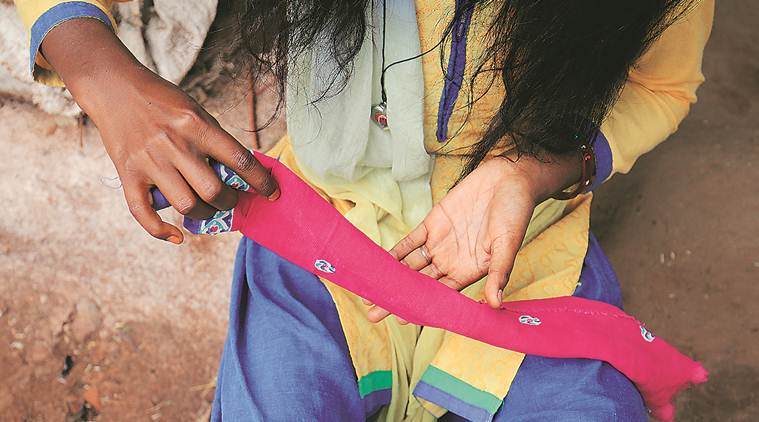 Tear an old sari into rectangles the size of a big notebook(Express Photo by Renuka Puri)
Tear an old sari into rectangles the size of a big notebook(Express Photo by Renuka Puri)
Triveni and Manisha have just returned from their time at the banyan trees when the elder girl, still panting, admits money is an issue. “Rs 10, 20, 30, it is all very expensive,” Triveni says. “When I asked my mother once for money to buy the pads, she scolded me. I debated and debated and finally asked my father. He looked at me for sometime and then pointed towards a sack of rice. He asked me to sell it and take the money. I gave up… Where would I have sold the rice?”
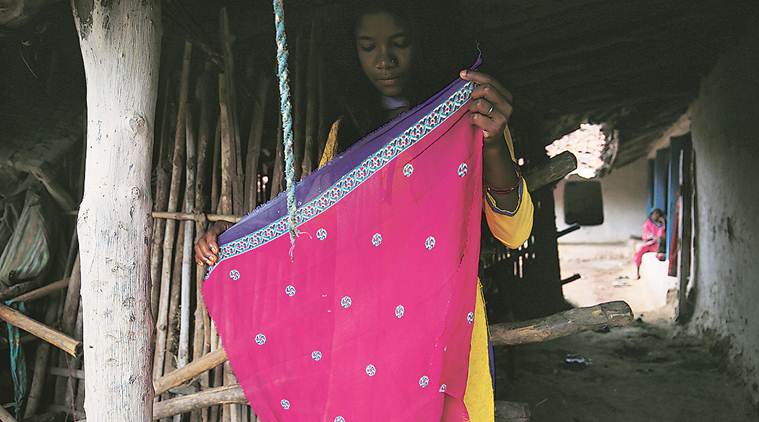 Fold the rectangles into shape of bricks, to be tied around waist like a langot during periods(Express Photo by Renuka Puri)
Fold the rectangles into shape of bricks, to be tied around waist like a langot during periods(Express Photo by Renuka Puri)
Manisha leans in to whisper something in Triveni’s ear. “Khud bata (Tell them yourself),” retorts Triveni. But it requires a little more prodding before Manisha speaks up. Disposing of the pads is a problem, she says. “During the anganwadi demonstration, we were told to wash the pads after using them, dig a hole in the ground, put the pads there, burn them, and then cover them with mud. Bahaut badboo aati hai (It stinks),” says Manisha.
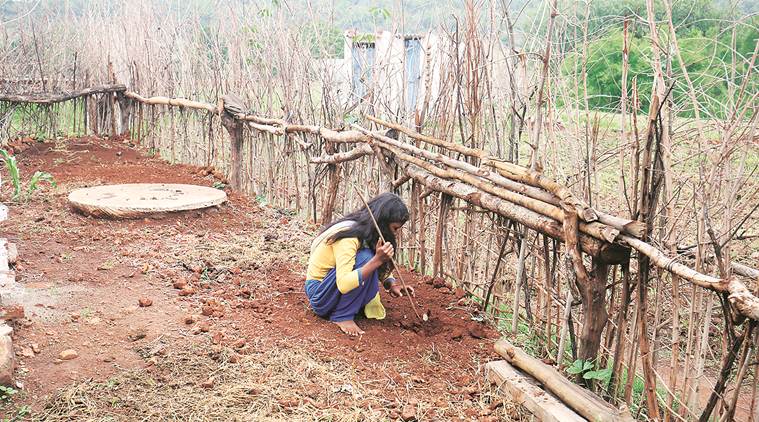 Dispose of the pads by washing them, burying them in a hole in backyard, and burning them(Express Photo by Renuka Puri)
Dispose of the pads by washing them, burying them in a hole in backyard, and burning them(Express Photo by Renuka Puri)
Goonj’s Gupta emphasises this point. “Both big manufacturers and the small production units have to come together and look at the issue in its entirety — disposal, sanitation, awareness. In rural areas we have agricultural land, and if we do not have proper disposal systems, we may end up polluting them. We have to be careful that in solving one problem, we do not create a bigger one.”
NAAN BAI, 17
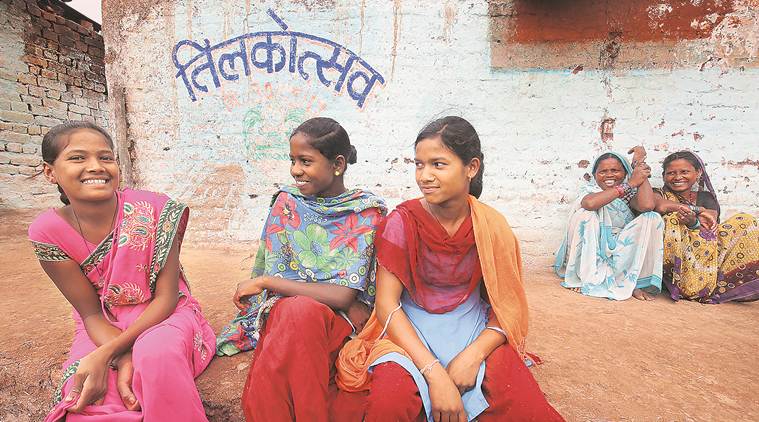 Naan Bai’s (above centre) mother made her drop out of school after Class 7, when she began menstruating(Express Photo by Renuka Puri)
Naan Bai’s (above centre) mother made her drop out of school after Class 7, when she began menstruating(Express Photo by Renuka Puri)
Naan Bai represents another face of the problem. The 17-year-old, of Surajpura village near Birhuliya, used to attend a government school 5 km from home. “Jab mahina hua, meri maa ne school jaane se mana kar diya (When I got my period, my mother asked me to stop going to school),” she says. Naan Bai was in Class 7 then. “I tried to protest, but she snatched away my notebooks and pens.”
A 2013 AC Nielsen study revealed that 23 per cent of girls in India drop out of school on reaching puberty. The study also found that a large number of girls, like Manisha, miss an average of 50 days of school each year because of menstruation.
For Naan Bai’s mother Bhawani Bai, the decision was “practical”. “She would get terrible cramps, it was better she stayed at home. The nearest hospital is two hours away, and even there, how do we ask for help? Sharam abhi hai humko (We have shame left),” says the 38-year-old.
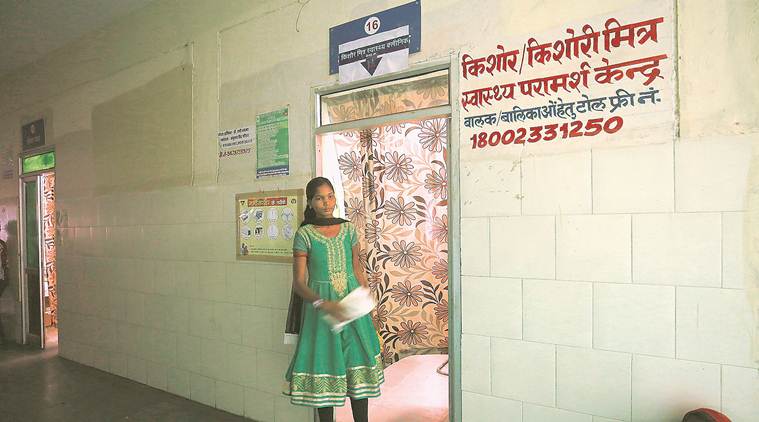 Adolescent girls are given free pads in district hospitals across the state, but not many are willing to come, fearful about being asked awkward questions back home (Express Photo by Renuka Puri)
Adolescent girls are given free pads in district hospitals across the state, but not many are willing to come, fearful about being asked awkward questions back home (Express Photo by Renuka Puri)
Satya Prakash Srivastav, a UNICEF district health coordinator in Umaria, talks about the “extreme reluctance” among girls and their families to approach health centres for any sort of counselling or medical help, or even sanitary napkins. “In most government hospitals in MP, pads are available as part of the ‘delivery package’. When a woman delivers a child, she is given a pack of free pads. There are provisions for adolescent girls to get free pads too, but only when they come for counselling. But they need to come here first,” says the officer, who is working with the state government under the NHM scheme.
J N Kansotia, principal secretary in the WCD Ministry in Madhya Pradesh, feels the disparity in menstrual health in rural and urban areas in the state is because of the “different levels of literacy and awareness”. “It is true for every state. Also, it is very difficult to measure menstrual hygiene and the use of sanitary pads is the only parameter. But then, in MP, 20 lakh pads are being sold every month through anganwadis,” he says.
But unlike in Birhuliya, Naan Bai and the other women of Surajpura have no access to sanitary napkins through anganwadi centres. The nearest centre is 2 km away and not many women visit it. A few girls of the village who stay in tribal hostels know of the napkins, but Naan Bai is surprised there is such a thing that could ease her “painful periods”. “Humne kabhi nahin dekha (I have never seen a pad),” she says.
She wonders though how they would change her life. “(During periods) I can’t do anything in the house, but my mother sends me to work in the paddy fields. It would be better if I could go to school with my friends.”
Apr 26: Latest News
- 01
- 02
- 03
- 04
- 05

















